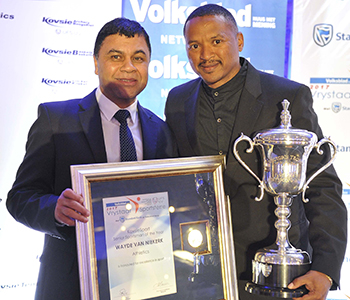
Wayde van Niekerk was unable to attend the KovsieSport Awards.
Steven Swarts, his stepfather, received the award for KovsieSport
Senior Sportsman of the Year from Prof Francis Petersen (left),
Rector and Vice-Chancellor of the University of the Free State,
on his behalf.
Photo: Mlungisi Louw/Volksblad
It took Kesa Molotsane seven years of hard work and patience to excel, and all this time she has been a Kovsie. Unlike some other sporting greats, success didn’t come overnight for her.
The star athlete had an amazing year and was crowned KovsieSport Senior Sportswoman of the Year, while Wayde van Niekerk is the KovsieSport Senior Sportsman of the Year for a fifth consecutive time. The 400 m Olympic Champion surpassed the record held by himself and Franz Kruger for most successive sports awards for men (four), and equalled Kruger’s record (five) for the most men’s titles overall.
Blose and Chawane top juniors
The cream of the crop was honoured at the KovsieSport Awards, held in collaboration with the Volksblad Free State Sport Stars Awards, at Monte Bello in Bloemfontein on 27 September 2017.
Kwenzo Blose, who represented the South African U20 rugby team at the Junior World Cup, was named Junior Sportsman for a second consecutive year. The netball player Khanyisa Chawane is the KovsieSport Junior Sportswoman of the Year. She captained the South African U21 netball team at the World Youth Netball Champs.
The blind athlete Louzanne Coetzee and her guide Khothatso Mokone received a Special Award for Disabled Sport. Coetzee took part in the Paralympic Games and has set many records, such as in the 5 000 m (T11).
Hard work over many years
Molotsane competed at the World Cross-country Championships in Kampala, is the leader of the Spar Women’s Grand Prix 10 km series, and represented South Africa at the World Student Games. The Assistant Officer at KovsieSport says being the best female athlete is humbling.
“It took me long enough to get here and it needed a lot of work from my side over many years. I have been with Kovsies for, like, seven years and I am only getting this after so long.”
She also commended Karla and Tanya Mostert who was nominated with her. “Karla has been a motivation for little kids from primary school up until high school learners. She has always been there and knows what it means to really be a sport star.
“And her younger sister Tanya is the upcoming one. It is amazing to be on stage with both of them.”
KovsieSport Awards:
• Participants in World Student Games in Tapei: Arné Nel (tennis), Hendrik Maartens (athletics), Janke van der Vyver (badminton), Kesa Molotsane (athletics), Lienke de Kock (tennis), Maryke Brits (athletics), Rynardt van Rensburg (athletics), Tsepang Sello (athletics).
• Special Award for Disabled Sport: Louzanne Coetzee and Khothatso Mokone
• Special Awards: Maryka Holtzhausen (netball), Janine de Kock, Marnus Kleinhans (tennis), Ans Botha, Rufus Botha (both athletics), Nicole Walraven (hockey) and Godfrey Tenoff (soccer)
• Junior Sportswoman of the Year: Khanyisa Chawane (netball)
• Junior Sportsman of the Year: Kwenzo Blose (rugby)
• Senior Sportswoman of the Year: Kesa Molotsane (athletics)
• Senior Sportsman of the Year: Wayde van Niekerk (athletics)